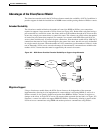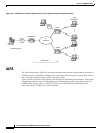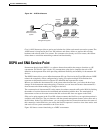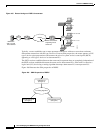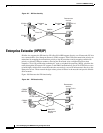
Overview of IBM Networking
SNA Switching Services
BC-235
Cisco IOS Bridging and IBM Networking Configuration Guide
SNA Switching Services
Note SNA Switching Services functionality supersedes all functionality previously available in
the APPN feature in the Cisco IOS software. SNASw configuration will not accept the
previous APPN configuration commands. Previous APPN users should use this chapter to
configure APPN functionality using the new SNASw commands.
SNASw provides an easier way to design and implement networks with SNA routing requirements.
Previously, this network design was accomplished using APPN with full network node (NN) support in
the Cisco router. This type of support provided the SNA routing functionality needed, but was
inconsistent with the trends in Enterprise networks today. The corporate intranet is replacing the SNA
WAN. Enterprises are replacing their traditional SNA network with an IP infrastructure that supports
traffic from a variety of clients, using a variety of protocols, requiring access to applications on a variety
of platforms, including SNA applications on Enterprise servers.
While SNA routing is still required when multiple servers must be accessed, the number of nodes
required to perform this function is decreasing as the IP infrastructure grows and as the amount of native
SNA traffic in the network decreases.
SNASw enables an enterprise to develop their IP infrastructure, while meeting SNA routing
requirements.
The number of NNs in the network and the amount of broadcast traffic are reduced. Configuration is
simplified, and SNA data traffic can be transported within the IP infrastructure. The following features
provide this functionality:
• HPR Capable SNA Routing Services
• Branch Extender
• Enterprise Extender (HPR/IP)
• Usability Features
• Management Enhancements
• LAN and IP-Focused Connection Types
Benefits of SNASw
SNASw provides the following benefits:
• Scalable APPN Networks
• IP Infrastructure Support
• Reduced Configuration Requirements
• Network Design Simplicity
• Improved Availability
• Increased Management Capabilities
• Architectural Compliance







